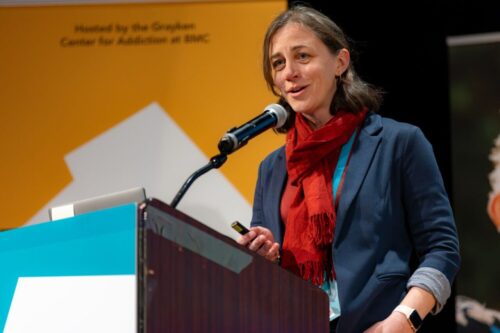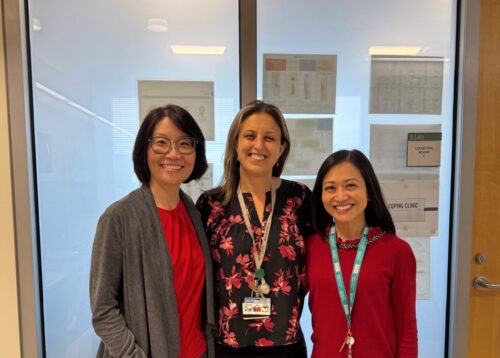
mmpile, Getty Images
As overdoses become leading cause of pregnancy-related mortality, new fellowship training brings specialists to Obstetric-Addiction Medicine.
Opioid use is increasing among pregnant people in the United States. From 2010 to 2017, pregnant persons diagnosed with opioid use disorder nearly doubled from 4.6 to 8.2 per 1,000 delivery hospitalizations. However, few obstetrician-gynecologists are trained to deliver care that meets the complex needs of this population. To help address this growing public health crisis, Boston Medical Center (BMC) has launched the Eilene Grayken Maternal Health Addiction Fellowship to bring more skilled physicians into the emerging field of Obstetric-Addiction Medicine.
“Substance use disorder has actually outpaced hemorrhage and cardiovascular disease as the leading cause of pregnancy-associated maternal mortality,” explains Kelley Saia, MD, director of Project RESPECT, a high-risk obstetrical and addiction recovery program at Boston Medical Center. “Providing this care not only offers a huge opportunity to intervene in the opioid epidemic, it also is an opportunity to provide evidence-based, trauma-informed care for pregnant persons with any substance use disorder” says Saia.
Formalizing New Specialty Training in Maternal Addiction Medicine
Building on its nationally-recognized work in maternal addiction medicine, BMC’s new two-year fellowship will provide training in the complex care of pregnant people with substance use disorders and prepare physicians for both the American Board of Obstetrics and Gynecology and the American Board of Addiction Medicine certifications upon completion.
Cecily Barber, MD —BMC’s inaugural Maternal Health Addiction Fellow—explains that historically residents interested in subspecialties would have to choose between Addiction Medicine and Maternal-Fetal Medicine or forge their own training pathways to gain expertise in both. The new fellowship formally unites the two.
“As a physician-in-training, you’ve gone through intense surgical training and residency for four years, and to take a year or two off [to specialize in Addiction Medicine] and lose those skills is a huge sacrifice,” Barber says. “Now, I am an attending in the OB department and a fellow in the Addiction Medicine department. I’m able to keep up my general OB/GYN skills, focusing on care for patients with substance use disorders, while also gaining new skills and training in general addiction medicine.”
Meeting People Where They Are
Many people, especially those of childbearing age, solely visit obstetrician-gynecologists for their routine care. Training more OB/GYNs to screen and treat substance use disorder (SUD), connect people to services, and prescribe medications to treat substance use disorder can lead to earlier intervention for people at risk. These physicians are equipped to be more aware of the serious postpartum risks for persons with SUD. The vast majority (90.2%) of substance use‐related deaths occur in the postpartum period, when people closely connected to addiction services during their pregnancies and newly in recovery relapse. More OB/GYNs trained in addiction care could help extend support through the first postpartum year, addressing a huge care gap that negatively impacts health outcomes.
Attracting More Healthcare Professionals to Addiction Medicine
BMC’s Grayken Center for Addiction was founded through a $25 million gift from philanthropists John and Eilene Grayken in 2017. Since then, the Center has spearheaded numerous addiction medicine training programs for hospital- and community-based providers, including launching a first-of-its-kind Nursing Addiction Fellowship in 2020. These training programs enrich providers in their chosen practice and train new professionals—desperately needed given the severe shortage of addiction specialists in the country. Demand for addiction recovery professionals is only expected to increase as the COVID-19 pandemic intensifies the opioid crisis.
Obstetric-Addiction medicine offers a unique opportunity for physicians to intervene during a time of high motivation for patients with SUD, helping them break the generational cycle of substance use disorder that many families face. This type of impact motivates many entering the field, says Emily Rosenthal, MD, the fellowship’s director.
“Pregnancy is a tremendous opportunity to help people make changes in their lives. We see a lot of our patients come from families where substance use disorders have been a problem over several generations. They’re certainly not the first. To support somebody in early recovery during pregnancy and to support them thereafter in parenting can have a major impact on both mom and her children,” she emphasizes. “My hope is that graduates from our fellowship program [seeing the difference they can make] will become leaders and spread these specialized training opportunities to other institutions.”


